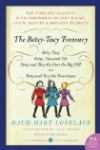11
Followers
23
Following
Reading Slothfully
I was told in elementary school that I only could read at half the speed for success in college. Oh well, one benefit of slow reading is you get to live with the characters a longer period of time. I read in a vain attempt to better understand people. At my other homes, I'm known as a spouse, pop, guy in the choir, physical chemist, computer/web dilettante and child-care provider. In theory, I'm a published author, if you consider stuff like Quenching Cross Sections for Electronic Energy Transfer Reactions Between Metastable Argon Atoms and Noble Gases and Small Molecules to count as publications. I've strewn dozens of such fascinating things to the winds.
Currently reading
Twenty Thousand Leagues Under the Seas
The Spirit of the Border
Ramona the Brave (Ramona, #3)
The Underground Man (Vintage Crime/Black Lizard)
Delilah of the Snows
Mrs. Miniver
Betsy-Tacy Treasury (P.S.)
A Christmas Carol
The Way Some People Die
Envy of Angels
Repent in Haste
 Well, I feel better. I'd previously read all six of the Mr. Moto novels by Marquand and found them delightful. Then I essayed to read his Pulitzer Prize winning novel and found it so uninteresting and dully written that I gave up about 18% of the way through. But, I felt guilty and figured I should jump back on the Marquand horse, so to speak. This was again a GoodRead, like Mr. Moto. All of which means, I suppose, that I am a literary philistine and nothing I say about books carries any consequence.
Well, I feel better. I'd previously read all six of the Mr. Moto novels by Marquand and found them delightful. Then I essayed to read his Pulitzer Prize winning novel and found it so uninteresting and dully written that I gave up about 18% of the way through. But, I felt guilty and figured I should jump back on the Marquand horse, so to speak. This was again a GoodRead, like Mr. Moto. All of which means, I suppose, that I am a literary philistine and nothing I say about books carries any consequence. This book is a novella (~28000 words) set toward the end of World War II. The protagonist, William Briggs, is a war correspondent assigned to the Pacific Theater. Over time, he learns that one doesn't make close friendships during war. One never knows who is next to go, so one doesn't want to be overly involved in what happens. But, before he learns this lesson, he becomes friends with and concerned about Lieutenant Boyden, known as Boysie. Over time, Boysie tells Briggs his life story, and when Briggs is due for leave, and plans on going back to New York for a time, Boysie asks him to look up his family and his wife, Daisy, both of whom live in East Orange, New Jersey.
Most of the book discusses the relationships people make or not during war time, including short romances during leave, which sometimes lead to quick marriages. Boysie met Daisy while he was at flight school at Pensacola. She had been engaged to someone else, but said that he'd thrown her over. Thus she took up with Boysie, they got married and had an idyllic marriage during the week or two that they drove north from Pensacola to set Daisy up in East Orange, before Boysie had to head off to the Pacific Theater.
Naturally, by the time Briggs got to East Orange, there were complications, some with the Boyden family and some with Daisy. All in all, this was a nice tale of life during war. I think it would have made a great movie back in the day. I'm seeing it in my mind in black and white, because everything on the "big screen" was black and white back in the good old days.













